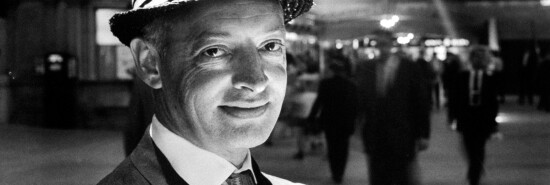
What made Saul Bellow a master
Chris Vognar
In the new documentary The Adventures of Saul Bellow, the black novelist and literature professor Charles R. Johnson reads a passage aloud from Bellow’s 1971 novel Mr. Sammler’s Planet. In the excerpt, Arthur Sammler, a Holocaust survivor bewildered by life in post-‘60s New York City, is accosted by a black man who makes Sammler look at his penis, which Bellow describes in gratuitous detail. Closing the book and shaking his head, Johnson, who won the 1990 National Book Award for his slavery novel Middle Passage, says what we’re thinking: “This, unfortunately, is racist.” It’s hard to argue otherwise. Bellow, an avowed opponent of multiculturalism, has reduced one of his very rare black characters to his member.
What’s important, however, is that Johnson considers Bellow, who died in 2005, an absolutely essential writer. He argues that one can’t grapple with American literature without reading the man who won three National Book Awards, a Pulitzer, and a Nobel Prize in Literature. And this is the great takeaway from this PBS American Masters documentary, now streaming on the PBS website. Sometimes it’s important to read a writer whose politics you abhor, whom you almost certainly wouldn’t want to marry — five women wed Bellow, and he used most of them as not-very-flattering fodder for his fiction — and with whom you might have very little in common. Bellow wrote transcendent sentences and stories about the human condition and what it meant to be an American in the 20th century. He also thought the ‘60s were a mistake. In this package, you can’t have one without the other.
Shot with a drab color palette that resembles a yellowed paperback page, The Adventures of Saul Bellow strives to capture what makes the author of The Adventures of Augie March and Herzog a quintessentially American writer, even though he was born in Quebec and moved to Chicago when he was 9. He would forever be identified with the culture and muscularity of his adopted city, starting with the first sentence of Augie March, his first novel: “I am an American, Chicago born — Chicago, that somber city — and go at things as I have taught myself, free-style, and will make the record in my own way: first to knock, first admitted; sometimes an innocent knock, sometimes not so innocent.”
In the film, the late Philip Roth, who died in 2018 — this thing was in production for a while — another great Jewish American writer, claimed Bellow “blew the lid off the sentence,” a lid that had been fastened by the terse minimalism of Hemingway. Bellow wrote sentences in which you could luxuriate, sentences that ask to be interpreted and reinterpreted. In an archival interview, Bellow recalls reading Joseph Conrad when he took the L train to classes at Northwestern University, dissecting the great writer’s paragraphs to see if he could reconstruct them to make them better. He was an anthropology student, and one of his professors told him his anthropology papers read like short stories. And so he became a novelist.
Nobody here steps forward to say Bellow was a great guy. He seems to have been a serial philanderer. He ruthlessly pillaged his personal life to feed his fiction. He outed his friend, the closeted conservative scholar Allan Bloom, in his 2000 novel Ravelstein. The feminist critic Vivian Gornick suggests Bellow’s sense of white male grievance “became pathological.” “He was not a nice fellow,” said Roth, one of his biggest admirers. He lived for his work, which was generally magnificent.
Director Asaf Galay approaches Bellow without judgment, letting others touch on the writer’s less savory qualities. The general consensus is that his knock was not so innocent. But when the words were flowing, there were few better. Bellow was a razor-sharp observer of modern society’s discombobulation, the chaos that Sammler so feared. You get the feeling he would look at the dominant strains in today’s conservatism, see the chaos run wild, and scurry back to his typewriter to consider what the country has wrought. Bellow, after all, had no appetite for radicalism, zealotry, or sloppy thinking.
For all of his borderline misanthropy and his resistance to change, Bellow believed in America and the mobility it makes possible. He believed in the dream and knew how quickly it could become a nightmare, such as with the punishing midlife crisis suffered by the title character of Herzog.
He remains one of those writers whose words help explain us — even if we don’t much care for the explanation.
Chris Vognar is a culture writer living in Houston.
